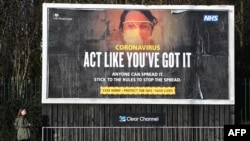ລັດຖະບານອັງກິດໄດ້ໃຫ້ການອະນຸມັດຕໍ່ການທົດສອບເທື່ອທຳອິດຂອງໂລກທີ່ ບໍ່ເຄີຍມີມາກ່ອນ ໂດຍຈະໃຫ້ອາສາສະໝັກຖືກເຜີຍແບດ້ວຍຄວາມຕັ້ງໃຈ ໃສ່ເຊື້ອໄວຣັສໂຄໂຣນາໃໝ່.
ພາຍໃຕ້ອັນທີ່ຮ້ອງວ່າ ການທົດລອງແບບທ້າທາຍຂອງມະນຸດນີ້ ບັນດາອາສາສະໝັກ
ຫຼາຍເຖິງ 90 ຄົນ ທີມີອາຍຸລະຫວ່າງ 18 ປີ ຫາ 30 ປີ ຈະຖືກເຜີຍແບໃສ່ເຊື້ອໄວຣັສ
“ຢູ່ບ່ອນທີ່ປອດໄພ ແລະພາຍໃຕ້ບັນຍາກາດທີ່ມີການຄວບຄຸມ” ເພື່ອອະນຸຍາດໃຫ້ພວກ
ນັກຄົ້ນຄວ້າສຶກສາເບິ່ງວ່າ ມັນແຜ່ຜາຍ ແລະຕິດ ແປດໃສ່ຜູ້ຄົນຢ່າງໃດ ຊຶ່ງເປົ້າໝາຍໃນ
ທີ່ສຸດກໍແມ່ນພັດທະນາວັກຊີນແລະການ ປິ່ນປົວ ທີ່ໄດ້ຜົນຫຼາຍຂຶ້ນ.
ການທົດລອງມີກຳນົດຈະເລີິ້ມຂຶ້ນໃນເດືອນໜ້ານີ້ ທີ່ໂຮງໝໍລອນດອນ ຣໍຢອລ ຟຣີ ໂຮສພີຕອລ (London Royal Free Hospital).
ໃນຂະນະດຽວກັນ ຍີ່ປຸ່ນ ໄດ້ເລີ້ມໂຄງການສັກຢາວັກຊີນ ທີ່ລໍຖ້າມາເປັນເວລາດົນນານ
ແລ້ວນັ້ນ ໃນວັນພຸດວານນີ້.
ການສັກຢາເທື່ອທຳອິດໄດ້ເລີ້ມຂຶ້ນຢູ່ໂຮງໝໍໂຕກຽວ ບໍ່ພໍເທົ່າໃດຊົ່ວໂມງຫຼັງຈາກໄດ້ຮັບ
ຢາວັກຊີນໄບໂອແອນເທັກສ໌. ມີພວກທ່ານໝໍ ແລະນາງພະຍາບານ ຢູ່ ທົ່ວປະເທດຫຼາຍເຖິງ 40,000 ຄົນ ຈະໄດ້ຮັບການສັກຢາໂດສທຳອິດ ຊຶ່ງເປົ້າ ໝາຍໃນທີ່ສຸດກໍແມ່ນສັກຢາ
ໃຫ້ແກ່ພະນັກງານການແພດ 3 ລ້ານ 7 ແສນຄົນ ພາຍໃນເດືອນມີນາ ຕິດຕາມມາດ້ວຍປະ
ຊາຊົນຜູ້ມີອາຍຸ 65 ປີ ແລະແກ່ກວ່າ ນັ້ນ.
ໂຄງການສັກຢາຂອງຍີ່ປຸ່ນໄດ້ເລີ້ມຂຶ້ນຊ້າ ຍ້ອນບັນດາເຈົ້າໜ້າທີ່ການແພດ ໄດ້ໃຫ້ການ
ອະນຸມັດຢ່າງເປັນທາງການ ໃນການສັກຢາຟາຍເຊີໄບໂອແອນເທັກສ໌ 2 ໂດສ ໃນວັນອາ
ທິດແລ້ວນີ້. ພວກເຈົ້າໜ້າທີ່ ໄດ້ຂໍຮ້ອງໃຫ້ຟາຍເຊີທຳການທົດ ລອງຢາວັກຊີນຕື່ມ ເພີ້ມ
ໃສ່ການທົດລອງ ໃນຂັ້ນຕົ້ນ ທີ່ໄດ້ມີຂຶ້ນຢູ່ໃນປະເທດ ອື່ນໆ. ລັດຖະມົນຕີຮັບຜິດຊອບໃນ
ການສັກຢາຂອງຍີ່ປຸ່ນ ທ່ານຕາໂຣ ໂກໂນ ກ່າວຕໍ່ບັນດານັກຂ່າວໃນວັນອັງຄານທີ່ຜ່ານ
ມາວ່າການເພີ້ມການທົດລອງແມ່ນ ເພື່ອຄໍ້າປະກັນ ຄວາມປອດໄພຂອງປະຊາຊົນຍີ່ປຸ່ນ.
ການສັກຢາບໍ່ແມ່ນການບັງຄັບຢູ່ໃນຍີ່ປຸ່ນ ແລະໃນຂະນະທີ່ທ່ານທ່ານໂກໂນ ໄດ້ສະແດງ
ຄວາມໝັ້ນໃຈຂອງທ່ານ ກ່ຽວກັບການເຂົ້າເຖິງ ບັນດາພະນັກງານແພດແຖວໜ້າ ແລະ
ພວກຄົນເຖົ້າ ທ່ານຮູ້ວ່າ ທ່ານຕ້ອງວາງແຜນເພື່ອຜົນສຳເລັດໃນ ການເຂົ້າເຖິງພວກຜູ້ຄົນ
ໜຸ່ມກວ່າ ແລະຊັກຊວນໃຫ້ພວກເຂົາເຈົ້າສັກຢາ.
ພ້ອມໆກັບການອະນຸມັດຕໍ່ຢາວັກຊີນຟາຍເຊີໄບໂອແອນເທັກສ໌ນັ້ນ ຍີ່ປຸ່ນໄດ້ເຊັນສັນຍາ
ຊື້ຢາວັກຊີນແບບສອງໂດສ ຈາກບໍລິສັດອາສຕຣາເຊເນກາແລະໂມເດີນາ ໃຫ້ພຽງພໍ
ສຳລັບ 157 ລ້ານຄົນ.
The British government has approved the world’s first-ever test that will involve deliberately exposing volunteers to the novel coronavirus.
Under the so-called human challenge trial, up to 90 healthy volunteers between the ages of 18 and 30 will be exposed to the virus in “a safe and controlled environment” to allow researchers to study how it spreads and affects people, with the eventual goal of developing more effective vaccines and treatments.
The trials are scheduled to begin next month at London’s Royal Free Hospital.
Meanwhile, Japan began its long-awaited coronavirus vaccination program Wednesday.
The first shots took place at a Tokyo hospital just hours after it received the Pfizer-BioNTech vaccine. As many as 40,000 doctors and nurses across the nation will receive the first doses, with the eventual goal of inoculating 3.7 million medical personnel by March, followed by about 36 million citizens 65 years of age and older.
Japan’s vaccination program is off to a slow start, with health authorities only formally approving use of the two-dose Pfizer-BioNTech drug on Sunday. Officials asked Pfizer to carry out further tests on the vaccine in addition to earlier tests that had been conducted in other countries. Taro Kono, the country’s vaccine minister, told reporters Tuesday the additional testing was conducted to reassure the Japanese people of its safety.
Vaccinations are not compulsory in Japan, and while Kono voiced confidence he could reach front-line workers and elderly people, he acknowledged he needed to formulate a plan for successfully reaching younger people and encourage them to get the shot.
Along with Pfizer-BioNTech, Japan has signed contracts to procure millions of doses of the vaccine from AstraZeneca and Moderna, enough in all for 157 million people




